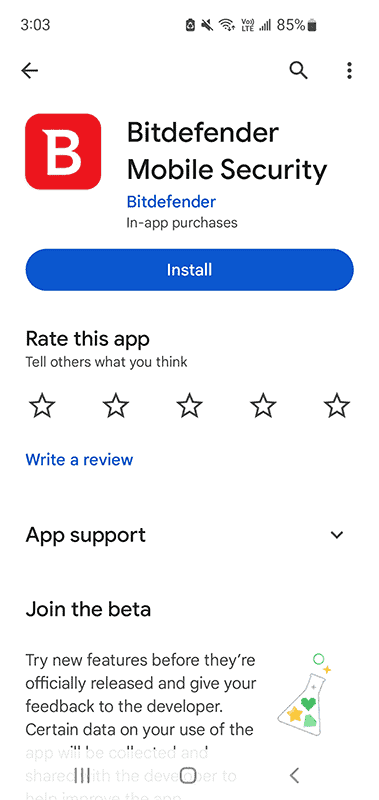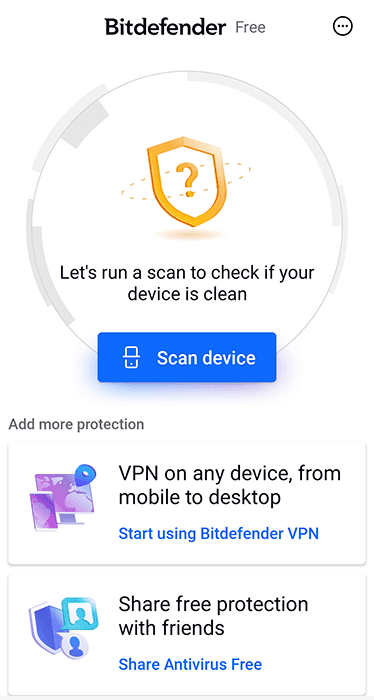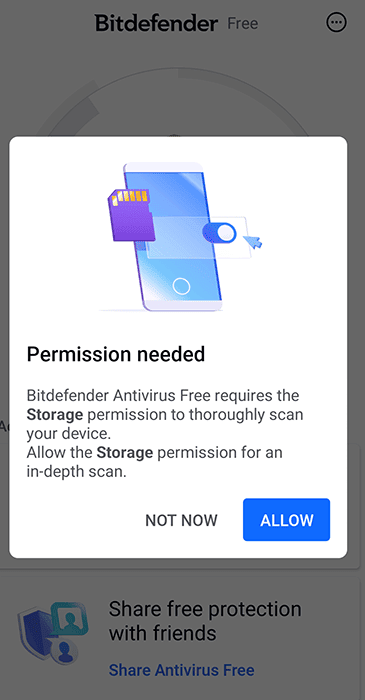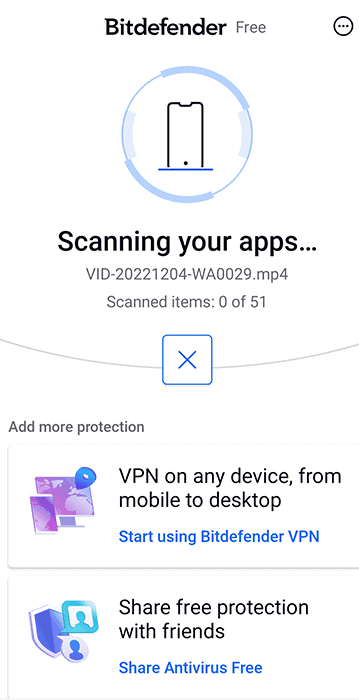Third-party apps, text messages and sometimes even verified Google Play apps pose several malware risks to Android devices, so having antivirus on your device is essential. In this guide, we will go over our top seven free and paid antivirus options for Android to keep you safe online.
Google Play Protect is integrated into new Androids, but its performance in lab tests was not as good as it should have been. In AV Comparatives tests, it had a high rate of false positives and a 98.9% protection rate — the lowest malware detection score of any antivirus protection on this list. On its own, you can’t trust it to catch scam emails or malicious apps.
AV-TEST conducted a six-month endurance test comparing Google Play Protect with 15 other security apps. Each app was required to detect just fewer than 20,000 malware apps. The results showed that every other security app offered better protection than Google Play Protect, so it is worth getting separate antivirus protection.
-
02/10/2022
Updated this roundup to include honorable mentions.
-
02/13/2024 Facts checked by Alison Spedale
This article was updated to contain new information about the best antivirus for Android devices in 2024.
Cloudwards Editor’s Choice: Bitdefender Mobile Security
Bitdefender is the best antivirus software in general and has excellent malware protection and is equipped with a range of useful features. It scans apps for malware, protects against phishing and other malicious sites, monitors texts and chat messages for dangerous links and includes a basic VPN.
Bitdefender is at the top of the list because it offers a rare combination of great value, effective security and a minimal impact on performance. It is easy to use, has a good free plan and is light on system resources, so it won’t drain your phone battery. It’s also full of useful features like an app locker, anti-theft tools, data breach alerts and a VPN.
The 7 Best Android Antivirus Apps Compared
1. Bitdefender — The Best Free Antivirus for Android Devices
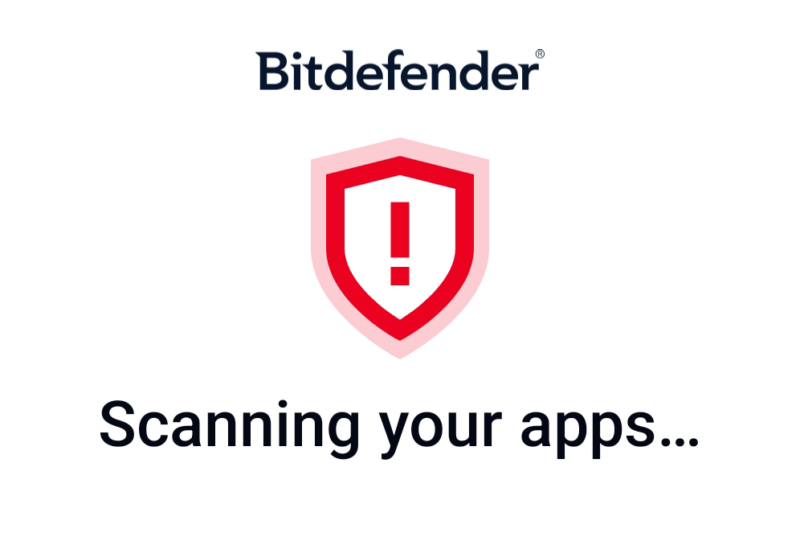
More details about Bitdefender:
- Bitdefender malware lab score: 99.98%
- Pricing: Free, $1.67 per month
- Website: bitdefender.com
Pros:
- Excellent free plan
- Android Wear integration
- 100% protection in lab tests
Cons:
- Confusing pricing
Key antivirus features: Bitdefender offers real-time data protection combined with network threat prevention and ransomware protection that defends against emerging threats like deepfake attacks and AI-powered cyberattacks. It also has anti-phishing capabilities that flag potentially threatening sites for users shopping online or browsing the internet.
Bitdefender provides vulnerability assessment reports that provide an overview of any weak points in your system. It also has a file shredder that permanently eliminates sensitive data.
Both the paid and free versions protect against ransomware and malware. Bitdefender Total Security comes with a VPN, but you cannot adjust the server location settings. Anti-theft tools track or remotely lock your device, and Bitdefender Mobile Security will alert you if your details appear in a data breach.
Other cybersecurity features: Bitdefender’s paid version comes bundled with Bitdefender Secure VPN. Business clients have the option to include Bitdefender’s GravityZone Security platform, which offers email server protection, security patch management and data encryption. It also has an app lock and anti-theft tools.
User experience and performance impact: Bitdefender has minimal impact on system resources and a clear and uncluttered user interface. It has anti-theft capabilities but does not flag calls or texts from potentially malicious sources like Avast and Malwarebytes do. It consistently performs well in AV and MRG Effitas lab testing and in our own tests. For more on those tests, read our full Bitdefender review.
Pricing: Bitdefender’s free version offers both on-demand scanning and real-time protection for Android phones. You can also install it on a mobile device as part of its Total Security plan, which protects up to three devices. Bitdefender Mobile Security costs $2.50 per month, billed at $29.99 for the first year, and includes a VPN and anti-theft protection.
- Unlimited devices (Windows only)
- 3 devices
- 3 devices
More plans
- 5 devices
- 15 devices
- 10 devices
- 10 devices
- 10 devices
2. Norton — Best Mobile Security For Your Android Phone
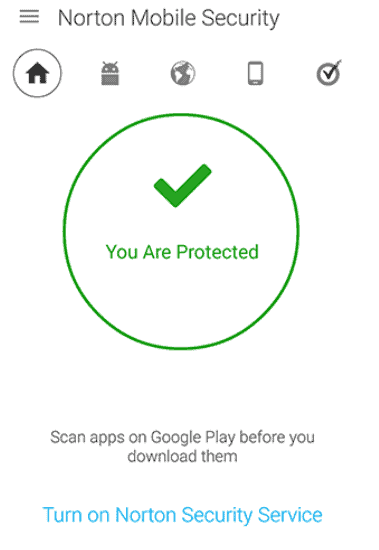
More details about Norton Security:
- Norton malware lab score: 99.98%
- Pricing: Free, $1.67 per month
- Website: norton.com
Pros:
- Support most OSes
- Strong lab results
- Solid customer support
- Has VPN support
- Identity theft prevention
- Parental controls
Cons:
- No support for Linux
- No free plan available
- Limited features on cheaper plans
Key antivirus features: Norton 360 Security offers web protection that flags potentially malicious sites, WiFi security that makes sure the network you are using is safe and cloud backup. It includes app protection for Android that checks installed apps for threats, as well as App Advisor for Google Play that checks new Android apps for risks. Its firewall provides granular control over network access.
Other cybersecurity features: Beyond antivirus, the Norton Android security app includes a password manager, a VPN, cloud backup with up to 250GB storage and browser extensions called Safe Web and Safe Search. These offer browsing safety and parental controls, respectively, for Google Chrome, Firefox, Safari and Microsoft Edge.
User experience and performance impact: Norton’s interface is user-friendly for routine tasks, but navigating through settings can be complex. It offers a variety of scanning options, from a quick scan to a more thorough full scan to a custom scan for individual files. Norton doesn’t require as much CPU as McAfee, but its resource use may impact the performance of older devices during full scans.
Pricing: Norton’s basic AntiVirus Plus plan for one device starts at $1.67 per month, billed at $19.99 for the first year. Norton’s Standard plan is a better value for those wanting to protect a PC, phone and tablet, as it offers protection for three devices at $3.33 per month, billed at $39.99 for the first year.
Check out our full Norton Security review or try it out with the 60-day money-back guarantee if you’d like to see for yourself.
- Full protection from viruses and malware, 2GB of cloud storage, integrated firewall, password manager, protection for one PC or Mac
- Protection for one PC, Mac or mobile device, 10GB of cloud storage, webcam protection, dark web monitoring
- Protection for five devices, parental control, 50GB of cloud storage
- Protection for five devices, 100GB of cloud storage, full access to LifeLock’s identity protection
3. Avast Mobile Security — Best Android Malware Detection
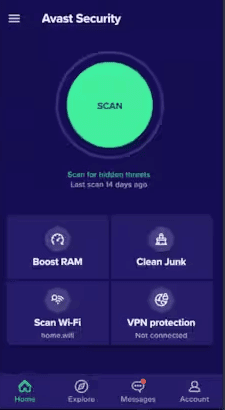
additional features but at a somewhat high price.
More details about Avast:
- Avast malware lab score: 99.97%
- Pricing: Free, $3.33
- Website: avast.com
Pros:
- Plenty of features
- Easy to use app
- WiFi network protection
Cons:
- No live chat customer support
- Collected user data in the past
Key antivirus features: Avast 360 offers strong malware protection, secure browsing and network protection. Its free secure browser encrypts all traffic and blocks trackers, ads and sites associated with phishing. Avast also includes a basic password manager and a WiFi inspector that checks for vulnerabilities in home or public WiFi connections.
Other cybersecurity features: Avast’s “real site” feature safeguards users from DNS redirections that might steal sensitive information. It also has a sandbox mode that creates a virtual environment separate from the rest of your system. Avast will run any suspicious download in sandbox mode and quarantine it if it turns out to be malware. Users can also manually run any .exe file in sandbox mode.
User experience and performance impact: Avast has a clean design that is easy to navigate, and the software has minimal impact on system performance during scans. The free version has a lot of ads but includes system scanning, a WiFi speed check and Avast cleanup, which cleans the cache and junk files from your device.
Pricing: Avast has a free plan with ads that comes with basic antivirus features, including excellent malware protection. Its cheapest paid plan is $39.99 or $3.33 per month for the first year (and $39.99 the following year) and includes an ad blocker, link scanning and quick replies from customer support.
More plans
4. Kaspersky — Best Real-Time Security For Android
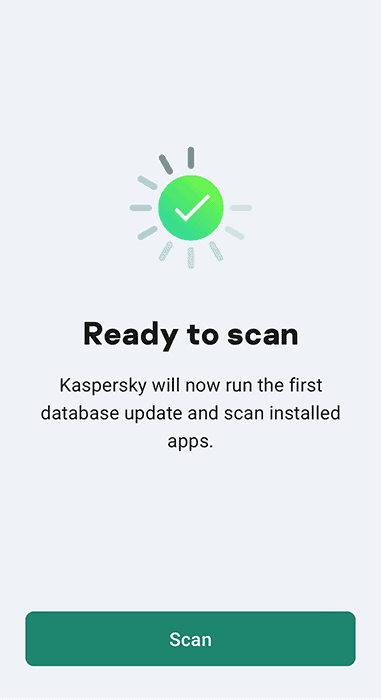
More details about Kaspersky:
- Kaspersky malware lab score: 99.97%
- Pricing: $2.50
- Website: kaspersky.com
Pros:
- Excellent lab results
- Android Wear integration
Cons:
- Limited features on free plan
- Data privacy concerns
Key antivirus features: Kaspersky is a Russian antivirus that U.S. governmental agencies have criticized. Its potential data privacy concerns have led to hesitancy among users, but this antivirus has good malware protection and high scores from testing labs. It offers real-time protection, a password manager, parental controls and stalkerware protection.
Kaspersky Internet Security Mobile received good malware protection scores both in our own testing and at AV Comparatives and MRG Effitas. It protects through real-time scanning and manual scans and defends against phishing scams. The paid version supplements these features with scheduled scans and text and call filtering.
Other cybersecurity features: Kaspersky integrates with Android Wear so it can monitor device security directly from wearable devices. It also has device controls that offer the possibility to locate or remotely wipe lost or stolen devices. The paid version allows users to schedule scans and has phishing scam protection.
User experience and performance impact: Kaspersky’s free version is a little too heavy on ads but is intuitive to use and has minimal impact on Android device performance and battery life. Lab tests showcased zero false warnings, high protection rates and negligible battery drain during typical usage scenarios such as web browsing and photo viewing. For more on this, see our full Kaspersky review.
Pricing: Kaspersky offers two versions of its Internet Security Mobile for Android. The free version includes manual scanning and real-time protection. For scheduled scans, text/call filtering and phishing scam protection, the paid version is available at an annual rate of $29.99. If you have Total Security on another device, your Android can be added to the plan.
- Three PCs, ransomware protection
- Three devices, banking protection, webcam protection, parental controls
- Five devices, password manager, backup and restore, advanced parental controls
5. ESET — Best Lightweight Antivirus for Android
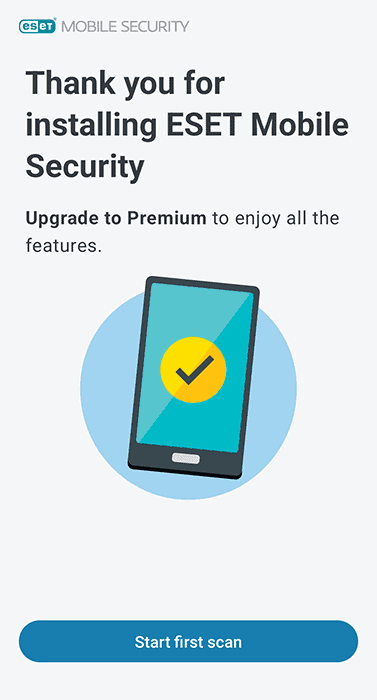
More details about ESET:
- ESET malware lab score: 99.96%
- Pricing: $3.33
- Website: eset.com
Pros:
- Light on resources
- Easy to use app
- Excellent video tutorials
Cons:
- Limited free plan
- Knowledgebase isn’t beginner-friendly
Key antivirus features: ESET NOD32’s primary features are its strong malware protection, exploit blocking to prevent malware from taking advantage of system vulnerabilities, ransomware protection and script-based attack prevention. A script-based attack uses code to execute an attack on a device, and ESET’s security detects and blocks such attacks.
It includes a Unified Extensible Firmware Interface (UEFI) scanner that detects deep-seated malware before system boot-up, catching threats before they have a chance to damage your computer.
Other cybersecurity features: The free Mobile Security plan is lightweight, so it doesn’t impact device functionality or drain your battery. The premium plans add a secure banking browser, a personal firewall, network attack protection, phishing protection and file encryption. There’s also an anti-theft feature that lets you lock, track and take photos remotely from a missing device.
Premium plans also allow users to schedule scans or perform system scans each time the device is charging. For more, read our full ESET NOD32 review.
User experience and performance impact: ESET Mobile Security offers an excellent free version and is very intuitive to use. The scan button is at the top of the page. Beneath that you can see how many files and apps ESET has scanned in the last month. The software works smoothly — even full system scans don’t slow down device performance and are completed quickly.
Pricing: ESET has a free plan for mobile and a 30-day free trial for Macs and PCs that doesn’t require a credit card. If you want the added features that come with the paid plan, one mobile device costs $3.33 per month, paid annually at $39.99, which is the same as many of the other cheaper plans for premium antivirus software. ESET offers a 30-day free trial of its premium plan.
- Basic Antivirus,
UEFI scanner,
Ransomware protection,
Windows only
- Banking protection,
Network protection,
Botnet scan,
Parental control,
Windows only
- Password manager,
Encrypted data,
Multi-platform
6. F-Secure — Best Beginner Antivirus for Android Devices
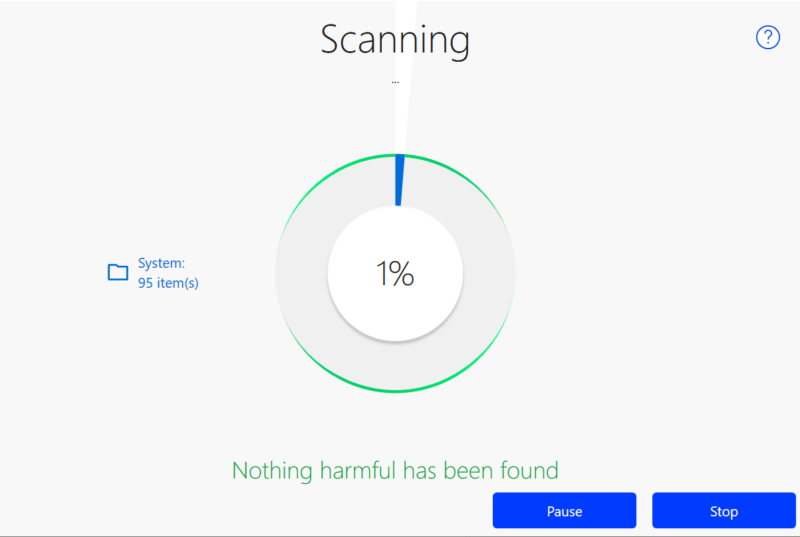
More details about F-Secure:
- F-Secure malware lab score: 99.91%
- Pricing: $4.17
- Website: f-secure.com
Pros:
- Strong lab results
- Many support options
- User-friendly
Cons:
- Limited features
- Expensive
Key antivirus features: Compared to Bitdefender or Malwarebytes, F-Secure is relatively light on features, but it does have a scanner that does a great job blocking malware, viruses, ransomware, banking trojans and spyware. In addition, the app provides browsing protection that blocks harmful websites. It also has a VPN and banking protection so you can safely shop online.
F-Secure includes a password vault that lets you generate strong passwords and store them all in the app. There is also an ID-monitoring feature that monitors your personal information and alerts you if any of it has been compromised in a breach.
Other cybersecurity features: The “my F-Secure” account feature on the Safe and Total plans provides device control through locator, alarm, lock and wipe tools for mobile devices. This allows users to manage their devices remotely. Additionally, the “family rules” section offers parental control features that allow parents to set time limits and content filters for app usage.
User experience and performance impact: The app is uncluttered, with just a central scan button and a list of features with descriptions of each feature’s functionality. A full scan takes a little longer than ESET’s, but there was no noticeable lag in other apps while the scan was running. You can add additional devices and check your subscription terms from within the app.
Pricing: The F-Secure Internet Security plan covers one device for $4.16 per month, billed at $49.99 per year. The 30-day free trial does not require a credit card and includes five devices — a perk on a plan that normally costs $67.49 per year. Although this is more expensive than a lot of other antivirus solutions, its ease of use and strong security make it worth trying.
- Antivirus protection for one Windows computer )with options for more)
- Protection for 5 devices, ransomware protection, My F-Secure integration, browsing protection
- Protection for 3 Windows computers, all features of F-Secure Safe, only available to existing customers
- Protection for three devices (with options for more), all features of Safe, password manager, VPN
7. McAfee — Best Antivirus for Multiple Devices
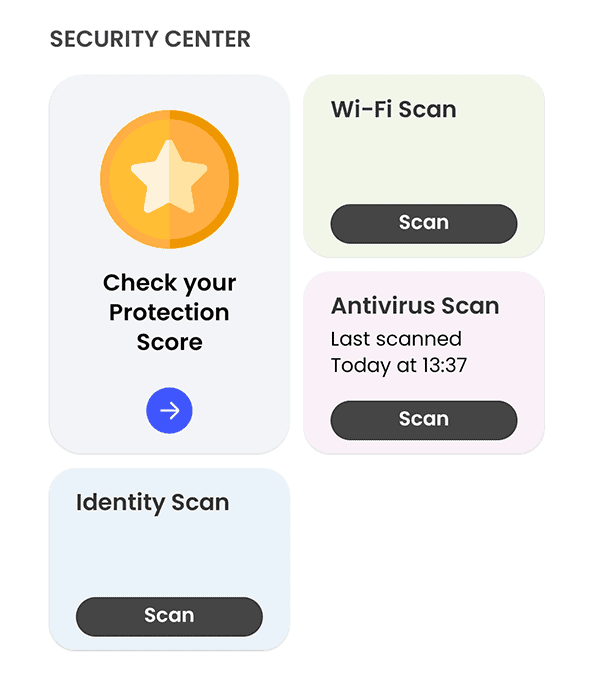
includes mobile and WiFi scans.
More details about McAfee:
- McAfee malware lab score: 99.95%
- Pricing: $2.08
- Website: mcafee.com
Pros:
- Cheap for multiple devices
- Fast scans
- Easy to use
Cons:
- Expensive single-device plan
- Drains phone battery
- No parental controls
Key antivirus features: McAfee Mobile Security includes real-time and on-demand scanning, a firewall, a VPN, identity monitoring and a file shredder feature that helps delete sensitive files from your computer so they can’t be recovered. The identity-monitoring feature is particularly useful, as it alerts you to any breaches of your personal information so you can take prompt action.
McAfee Mobile Security does not include an ad blocker or app locking. Additionally, the VPN included in the premium subscription does not allow users to select a location, making it useless for bypassing geo-restrictions.
Other cybersecurity features: McAfee uses AI to detect AI-generated scam threats, which is fast becoming a common feature in antivirus software. McAfee’s Project Mockingbird works by using AI to study the subtle differences between real and AI-generated audio and video and flagging it. Its scam protection scans text message URLs and alerts Android users if a scam link is detected.
User experience and performance impact: McAfee is known for using a lot of device resources, and its mobile app is no different. Users on Reddit and McAfee’s own forums have noted significant phone battery drain using the mobile antivirus. However, it does have a very clean interface, which makes it easy to run scans.
Pricing: McAfee has a free version that allows users to run an antivirus scan and check that their WiFi is secure. To access scam protection, safe browsing, the McAfee VPN and identity monitoring, users must pay for McAfee Total Protection on a monthly plan for $2.08 or $24.99 yearly. This is a lot more expensive than many other mobile antiviruses like Bitdefender or Norton360.
The cost for five devices is $3.33 per month or $39.99 yearly, which is a much more affordable option if you have more than one device.
- One year subscription,
$24.99 per device
- One year subscription,
$7.99 per device
- One year subscription,
$4.49 per device
How to Choose the Best Android Antivirus App
Choosing the top Android antivirus apps is a matter of matching your personal needs with what the app offers. Some factors we consider essential are listed below.
- Advanced malware protection: Malware protection detects, prevents and removes malicious software from your computer.
- Real-time protection: This is particularly important for protecting mobile devices, as users are less likely to perform regular scans on phones and tablets.
- Performance optimization: Choose an app that delivers strong security without significantly compromising your device’s performance or draining its resources.
- Feature set: Apps should offer functionalities such as anti-theft tools, secure browsing and privacy protection mechanisms such as a firewall or VPN.
- User-centric interface: It’s important that you not hate using the antivirus on your mobile device, so choose one with a straightforward interface. User-friendliness is also important for ensuring that you are managing the security settings and scans effectively.
How to Install & Use an Antivirus App on Your Android Device
Bitdefender antivirus is quick to install and intuitive to use. We’ll demonstrate how to install and use the software.
How to Check Your Android for Viruses
Bitdefender has an intuitive interface, so you can scan for viruses in a few steps.
Why You Need an Antivirus App for Android
An antivirus app for your Android device is essential due to the threats that malware, adware, phishing and ransomware pose in today’s digital landscape. Android devices come equipped with a built-in security solution called Google Play Protect, but it shows a lot of false positives in testing and scored a lower protection rate than the other antivirus solutions on this list.
Are Free Antivirus Apps Worth It?
There are some antivirus apps with very good free versions, including Bitdefender and F-Secure, but they do not offer the same full range of protection as the paid versions. Users with higher security requirements or who want to make use of advanced app features like a firewall or banking protection will probably want to choose the paid versions.
Final Thoughts
Safeguarding your Android device is important in order to protect against malware, phishing scams and ransomware. Although Android phones come with Google Play Protect, its security isn’t strong enough to keep you completely safe online. Bitdefender is our top choice for mobile security due to its exceptional malware protection, user-friendly interface and good value.
We would love to hear from you. Which antivirus app do you currently use on your Android device? Which features do you find most useful? Have you encountered any annoyances? Please share your thoughts, experiences and any tips for staying secure in the comments below. Thanks for reading!
FAQ.
-
Bitdefender provides comprehensive protection without much impact on performance. It includes tools like an app lock, a WiFi scanner and data breach notifications.
-
Though Android provides built-in safeguards such as Google Play Protect and regular security updates, antivirus apps on Android devices add another layer of defense against malware threats.
-
There are several free virus protection options for Android, including Bitdefender, Kaspersky, Avast, Malwarebytes and F-Secure.
The post The Best Antivirus for Android Devices in 2024: 7 Top Free & Paid Options appeared first on Cloudwards.







